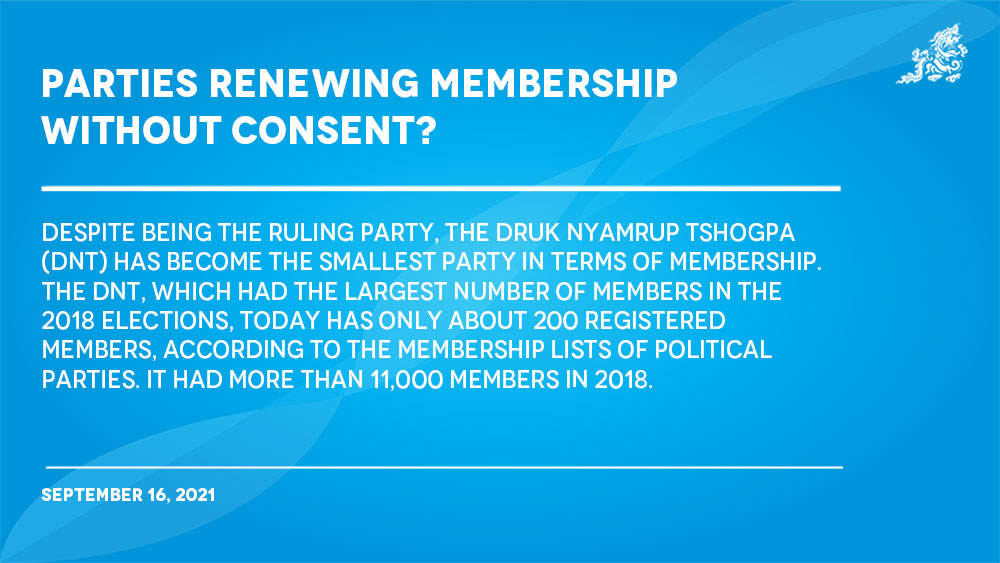MB Subba
Despite being the ruling party, the Druk Nyamrup Tshogpa (DNT) has become the smallest party in terms of membership.
The DNT, which had the largest number of members in the 2018 elections, today has only about 200 registered members, according to the membership lists of political parties. It had more than 11,000 members in 2018.
The other three political parties, however, have retained members, at least in their membership lists. The past trend was that most of the members would resign from their parties soon after the general election.
The Druk Phuensum Tshogpa (DPT), the People’s Democratic Party (PDP) and the Bhutan Kuen-Nyam Party (BKP) had 5,267, 5,143 and 1,200 members, respectively, according to the lists published recently by the Election Commission of Bhutan (ECB).
However, an official said that there could be some instances of the party secretariat retaining members despite them not coming forward to renew their membership.
The issue came to light after some of the aspiring candidates for the upcoming gewog elections found that they were registered members of political parties although they did not renew their membership after the 2018 election.
A tshogpa nominee each from Thimphu and Gelephu thromdes were disqualified during the scrutiny process on the grounds of party affiliation in the second thromde elections held in April this year.
Gyeltshen from South Thimphu wanted to contest as thromde tshogpa and participated in the functional literacy test (FLT). But he found out that he was still a member of the People’s Democratic Party (PDP) although he had not renewed his membership.
“I didn’t renew my membership since 2018 and was thinking that my membership would automatically expire after a year. I was surprised to find out that membership automatically gets renewed if we don’t apply for deregistration,” he said.
He said that he deregistered recently although it was too late.
Similarly, Kelzang Tashi from Choekorling gewog in Pemagatshel was disappointed to know that he was not eligible to contest in the upcoming local government election due to his affiliation with People’s Democracy Party (PDP).
He had applied for deregistration in October expecting that he would meet the cooling off period requirement for the upcoming election. But he found that his deregistration was effective only from February this year.
Members of parties Kuensel talked to said they assumed that they would be automatically deregistered if membership was not renewed.
One of the causes of the issue is that a member should write to the party to deregister himself from the party. But some of the party officials are not clear what would happen to the membership if members neither submit an application for deregistration nor renew their membership.
According to political parties’ charters, party membership would be renewed by paying a nominal fee to the party.
The general secretary of DNT, Phurba, said that it was unethical to retain the membership of people if they do not show interest to stay with the party.
He said that the DNT had the lowest number of members as the party secretariat did not renew membership for those who did not want to.
“After 2018 elections, people did not feel the need to keep their membership because the job of winning the election was done,” he said, adding that many might lose the opportunity of contesting the upcoming local government elections due to the membership issue.
DPT’s general secretary, Sonam Tashi, denied that his party had renewed anyone’s membership without his or her knowledge. “We don’t have the money to renew membership on others behalf.”
PDP’s general secretary, Kuenga Tashi, in an earlier interview said some of the members who had not renewed their membership had wrongly presumed that they were deregistered automatically.
He said that some members who found their membership active expressed their commitment to stay and work with the party.
Almost 12,000 people today are affiliated to political parties, as per the lists of political parties. The number of people affiliated with parties was only 871 in the second LG election in 2016.
The increase in the membership of political parties, observers say, could mean a decrease in choices of candidates in the upcoming elections given the small population as many would be ineligible to contest.
ECB maintains the membership lists based on the lists submitted by political parties.
ECB’s secretariat director, Phub Dorji, said that a member could deregister himself by submitting a letter to the party and that the party gives the updated lists to the ECB.
He said that parties should take responsibility to ensure that a person is deregistered if he no longer wants to remain as a member.
Membership fees are one of the sources of money for parties. A political party can also accept up to Nu 500,000 in voluntary contributions from its registered members as per the election Act.
Edited by Tashi Dema


